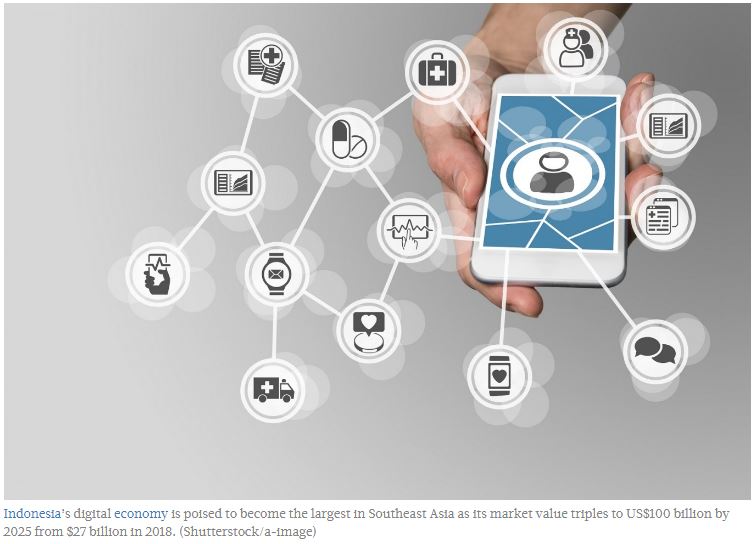Indonesia’s digital economy to dominate Southeast Asia by 2025
A new study has found that Indonesia’s digital economy is poised to become the largest in Southeast Asia as its market value triples to US$100 billion by 2025 from $27 billion in 2018, promising more jobs and more consumer choices for an emerging tech-savvy generation.
The annual “e-Conomy Southeast Asia” study, conducted by American tech giant Google and Singaporean holding company Temasek, says the growth will be spurred by four key digital services, namely e-commerce, with a contribution of 53 percent, online travel (25 percent), ride-hailing services (14 percent) and online media (8 percent).
“We see that these sectors have grown big and they will continue to grow in the coming years,” said Google Indonesia managing director Randy Jusuf during a press conference on the study on Tuesday.
Google head of strategy and insights Samuele Saini noted that the growth might be slightly higher than predicted because the study did not include emerging digital businesses such as those related to finance, health and education.
He said a lack of data on these businesses meant the study was unable to make reliable predictions.
A proliferation of digital services, particularly in e-commerce, diversifies product and service choices available for Indonesia’s 150 million smartphone users — the largest number in the region — especially for users located in more remote areas.
Similarly, homegrown e-commerce platforms Tokopedia and Bukalapak have launched advertisements highlighting their expansive logistics networks that can bring everything from electric guitars to rice cookers to even the remotest kampung home.
Google’s report, which is available on Thinkwithgoogle.com, says the digital economy will also increase employment opportunities as the average Southeast Asian internet-based company will increase staff by 10 percent each year.
A 2018 McKinsey report supports Google’s finding as it estimates that the digital economy could produce 3.7 million new jobs in Indonesia by 2025.
In addition to employment, Google’s report says the growth of transportation-facilitated digital services such as Grab and Go-Jek, which operate in food delivery, ride-sharing and logistics may triple “partner” jobs to 12 million region-wide in 2025 from 4 million this year.
However, even if Indonesia’s digital economy grows to the estimated $100 billion by 2025, it will contribute only 4 percent to a government target of $2.5 trillion in gross domestic product in the same year.
The contribution remains smaller than that in developed countries such as the United States at 6.5 percent or China (33 percent).
Nevertheless, Temasek portfolio strategy and risk group joint head Rohit Sipahimalani said during an interview with CNBC last week that he was confident Southeast Asia could “narrow the gap very rapidly” over the years to come.
“We’ve seen everything in the ecosystem slowly beginning to come together and that’s going to make all the difference,” he said.
Sipahimalani was referring to six factors — funding, internet connection, consumer trust, digital talent, logistics and payment methods — that limit digital economic growth, according to last year’s e-Conomy report.
Randy said at Tuesday’s conference that Indonesia had made significant progress with the first three factors, thanks to rising investor confidence, government infrastructure programs and effective marketing campaigns.
However, there remained “room for improvement” in terms of the availability of digital talent, logistics and payment methods, he said.
The government, for its part, promised to continue its infrastructure programs and to focus next year’s development policy on building human resources.
In regard to payment, Google’s report says that internet-based companies need to either partner or consolidate with other companies to increase the integration of payment services in an otherwise heavily fragmented payment landscape. (nor)
Source: http://www.thejakartapost.com/news/2018/11/28/indonesias-digital-economy-to-dominate-southeast-asia-by-2025.html


 Thailand
Thailand




